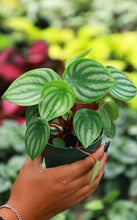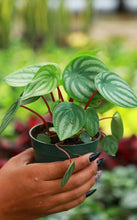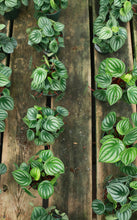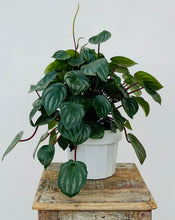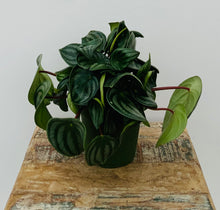
Watermelon Peperomia
All Peperomia Plants, which belong to the Pepper Family, are semi- succulents with very similar care requirements. The leaves of Peperomia houseplants are thick and plump, and can be rippled, smooth, or shiny. The color of the leaves of a Peperomia Plant can be various shades of green, red, gray, and cream, The pattern on the leaves may be marbled, striped, or a solid color. Peperomia Plant flowers are tiny and inconsequential, growing in clusters on upright conical spikes. When small, Peperomia houseplants can be used in dish gardens and terrariums. Compact Peperomia Plants are ideal for tables, and some varieties make excellent hanging plants. Most Peperomia houseplants never grow taller than 12”-18.”
LIGHTING REQUIREMENTS: Peperomia Houseplants grow well in the bright indirect light provided by a west or east- facing window. Peperomia Plants even grow under fluorescent lights. Insufficient light causes the slow growing Peperomia Plant to stop growing all together. Direct sunlight burns the leaves of Peperomia Plants.
CARE INSTRUCTIONS WATER: Allow the top 50% of the soil of Peperomia houseplants to dry out before watering. Over-watering, resulting in root-rot, is the main cause of serious Peperomia Plant problems. Peperomia houseplants should be watered from the bottom. This technique keeps Peperomia Plant leaves dry and helps prevent plant diseases. The thick leaves of Peperomia Plants hold water and allow the plant to withstand long periods without moisture.
FERTILIZER: Fertilize Peperomia HousePlants monthly in the spring and summer with a basic houseplant food at 1/2 the recommended strength. It’s not necessary to feed a Peperomia Plant in the fall and winter.
TEMPERATURE: Warm temperatures between 60-80 degrees are best for Peperomia houseplants. Temperatures below 50-55 degrees and cold drafts from windows and doors damage Peperomia Plant leaves.
HUMIDITY: Peperomia Plants are originally from the rain forests of Brazil and like a warm humid environment.
FLOWERING: The flowers of Peperomia Plants are very small and inconsequential. It's the leaves of Peperomia Plants that are so interesting.
PESTS: Houseplant pests such as Mealy Bugs and Aphids can be a problem for Peperomia Plants.
DISEASES: Ringspot, a virus that marks the leaves of Peperomia Plants with unsightly round marks, develops because of the high humidity Peperomia Plants like. Since there is no good treatment for Ringspot plant disease, damaged leaves and even the entire infected plant may have to be thrown out. Keep the leaves of Peperomia HousePlants dry and provide good air circulation to prevent Ring Spot disease.
SOIL: Use a well-aerated loose potting soil that drains well for Peperomia HousePlants.
Available for local pickup or delivery at The Plant Stand of Arizona.
Call for questions: (602) 304-0551
E-Mail: Sales@plantstandaz.com






